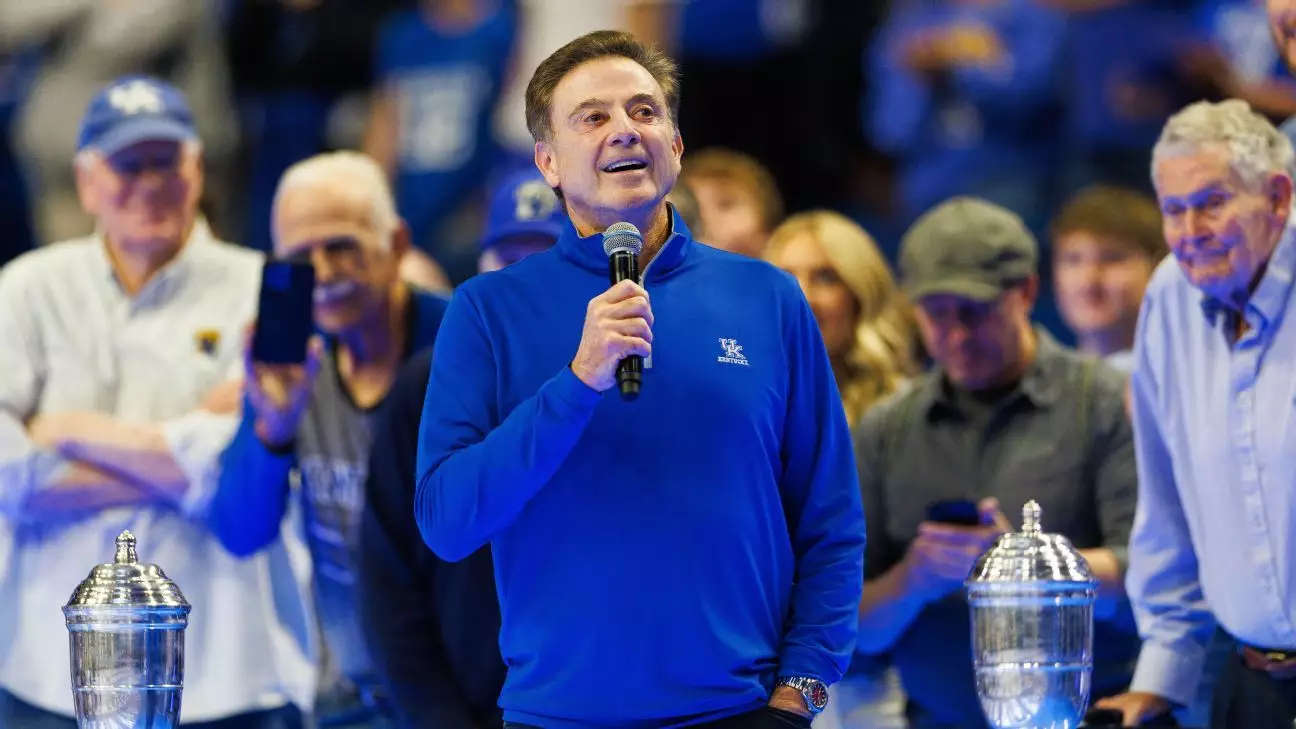On a defining evening in the realm of college basketball, Rick Pitino returned to Rupp Arena, a place steeped in his legacy, for the first time since his days as the head coach of the Kentucky Wildcats. Nearly thirty years after leading the Wildcats to a national championship in 1996, his reappearance during Kentucky’s Big Blue Madness event was greeted with overwhelming applause. Clad in a Kentucky sweater, Pitino stood as a figure of nostalgia, eliciting emotions both from fans and himself as he reflected on his storied past. He described the visit as coming back to “Camelot,” a poignant nod to his once-enchanted association with the program.
This return was more than a reunion; it was a reconciliatory moment bridging the chasm created during his career. Despite having faced adversity and backlash from the Kentucky fanbase over the years—especially after taking the helm at rival Louisville—the warmth of the welcome he now received illustrated a significant shift in sentiment. Surrounded by former players and legacy supporters, Pitino’s emotional struggle to speak publicly demonstrated the depth of his connection with Kentucky.
Pitino’s trajectory within the basketball community has not been devoid of controversy. In 1997, he left Kentucky for a lucrative, but tumultuous stint as the head coach of the Boston Celtics, which spurred mixed feelings among Wildcats supporters. His subsequent decision in 2001 to lead Louisville, Kentucky’s chief rival, further alienated him from the fanbase he once inspired. This choice was met with heavy criticism, as Pitino himself anticipated the backlash that would accompany his new role in Cardinal red.
His era at Louisville intensified the rivalry to unprecedented levels. The impassioned words he used to characterize the relationship between the two schools—calling it “pure hatred”—captured the intense fans’ emotions surrounding every match-up. Incidents like the alleged obscene gesture after a tough loss in 2015 only added fuel to a fire that seemed insatiable and rather contentious over the years.
Yet, within this tapestry of rivalry and tumult, Pitino managed to cultivate a mentorship with Mark Pope, who was appointed as the Wildcats’ coach following a challenging period under John Calipari. Pope, a former player under Pitino during the 1996 season, has begun to navigate the challenging waters of Kentucky leadership with an identity rooted in Pitino’s legacy. By endorsing Pope in his return address, Pitino took a large step toward restoring goodwill with a fanbase previously marred by resentment.
Pitino’s reunion had significant implications not only for him but also for college basketball’s landscape. In an era when the sport is increasingly reliant on coaches cultivating tight-knit communities, his newfound kindness toward Kentucky resonates deeply with fans and future players alike. Pitino’s public support for Pope illuminates a potential path to reconciliation between historical adversaries.
His remarks embody a vision of Kentucky basketball that transcends names etched in history. Instead, he emphasized the essence of what it means to be part of the program—a commitment to hard work, humility, and the collective potential of the team. By framing Pope’s leadership in such a selfless light, Pitino invites the Kentucky faithful to rally behind their team once again, emphasizing the promise of “greatness” under Pope’s stewardship.
Rick Pitino’s emotional return is emblematic of the wider story of transformation within the college basketball community. As he embraced the warmth of Kentucky’s fans, the rich tapestry of competition, rivalry, and eventual reconciliation took center stage. The evening stood not just as a celebration of Pitino’s iconic past but also as a heralding of a new chapter for Kentucky basketball—one where tradition and mentorship play vital roles in shaping future success. As the basketball world watches this unfolding narrative, one thing is clear: the complex relationship between rival schools can evolve, bridging divides and fostering renewed hope for what lies ahead in the sport.


Leave a Reply